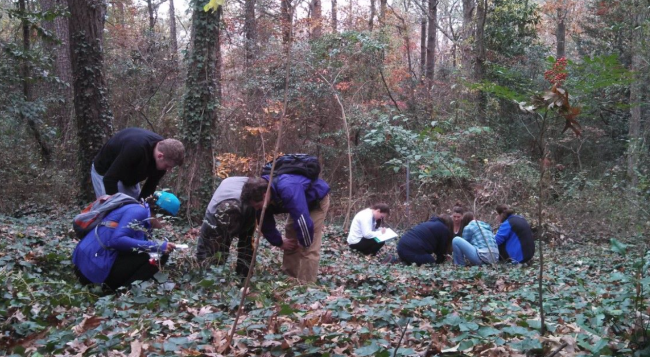You have /5 articles left.
Sign up for a free account or log in.

One of Jennifer Borgo's Friday classes doing fieldwork
Jennifer Borgo
Despite the increased chatter about evidence-based teaching practices, traditional academic structures don’t really support them: the average lecture hall screams for, well, lectures. It’s also hard to start and finish a dynamic learning activity within a typical 50-minute class block.
Seeking better ways to engage students and integrate its liberal arts and preprofessional missions, Coker College in South Carolina is doing away with that last convention, starting this semester -- sort of. Instead of holding classes on Mondays, Wednesday and Fridays for 50 minutes, the college has changed its schedule to allow interested professors teaching Monday-Wednesday-Friday courses within certain time slots to teach for an hour each on Mondays and Wednesday and for two hours every other Friday.
The Friday block is now an opportunity for pedagogical innovation and deeper student learning. Courses on many campuses are already offered in blocks of up to three hours, of course, but sometimes they are sustained lectures of the type that might take place in shorter periods. The idea at Coker is to actually use the time.
“Higher education in the last five or six years has reached a point where we talk very well and have a lot of good evidence about engaged learning, like flipped classrooms and active learning, but our basic systems don’t actually encourage or foster that,” said Tracy Parkinson, vice president for strategic partnerships and special assistant to the president at Coker. “So we were looking for relatively simple ways of creating an environment for faculty to do the kinds of instruction we’re reading about all the time.”
Parkinson and the rest of Coker’s administration strongly backed the initiative, but it was also inspired, in part, by a majority-faculty committee white paper on recruiting and retaining faculty members (the occasion for the report was a new college strategic plan).
The committee praised Coker’s “supportive and positive” work environment, including the transparency of the tenure process and new improvements to classroom spaces and technology. It also acknowledged recent efforts to foster collaboration and innovation in teaching but urged even more. Suggestions included more opportunities to co-teach courses, especially across disciplines; the adoption of cohort classes, with the same students in two or more courses; linked courses that meet separately some days of the week and together on others; and more flexibility in scheduling.
“We were looking at anything that we might need to change to improve student learning and student success,” said Will Carswell, chair of the Master Academic Planning Committee, vice president of external relations and a professor of music. “We didn’t shy away from the schedule, though any time you tinker with the schedule you are treading on thin ice.”
The college considered a variety of options for adopting the schedule blocks, such as having one day a week dedicated to them, but eventually settled on doing it on a voluntary basis within four time slots. So a 10 a.m. class section, for example, would meet Mondays and Wednesdays until about 11 a.m. and every other Friday until about noon; an 11 a.m. class would meet Mondays and Wednesdays and on the opposite Friday from 10 a.m. until noon.
Some faculty members who have been teaching for many years don’t want to change how they teach, and others want to see how the first semester goes before opting in. That’s fine with Coker, for now, but the college plans on talking about teaching blocks with prospective faculty hires going forward.
Approximately 20 percent of the faculty have opted in to the new schedule this semester, for at least one class. More professors may opt in next semester; English and business professors are currently planning linked courses. Coker sees the future in that kind of collaboration -- that which meaningfully blends the liberal arts and preprofessional studies and doesn’t strain teaching capacity like traditional team teaching does (when two professors are responsible for the same course).
Among those who have opted in to the program, faculty enthusiasm seems high, with some caveats. Jennifer Borgo, an associate professor of biology with a passion for undergraduate research, said she’s already teaching two courses according to the new schedule: a sophomore biology core class on ecology and evolution, and an upper-level biology elective called Behavioral Ecology. In both, Borgo tries to incorporate hands-on activities, in-class assignments and videos.
The ecology and evolution block has been somewhat difficult to manage, given that the class already has a three-hour weekly lab; Borgo said she has to fight the tendency to go long on lectures but breaks them up with active learning exercises and videos.
Borgo has “absolutely loved” the schedule for Behavioral Ecology, which has no lab period, however. “Fridays have been my time for exploration,” she said. During the first block, for example, Borgo assigned students an organism and they had to come up with questions, hypotheses and an experimental design.
“Given the emphasis I place on testing [predictions] in the class, I thought the students would greatly benefit from the activity,” she said. “And they did -- they were actively engaged and excited while working with their mealworms and beetles.” The second block will consist of a field trip to Carolina Sandhills National Wildlife Refuge, inspired by a conversation on helping behavior (nestlings from previous years that stick around and help the following year’s offspring); a typical species that displays such behavior is the red-cockaded woodpecker, and the class hopes to see some.
Joshua Webb, an assistant professor of theater, said, "From the beginning, I felt I was at something of an advantage in teaching under the new modified [schedule]." His courses in technical theater tend to be hands-on, he said, so "planning longer lab sessions every other Friday is not only easy but quite valuable to my students."
Additional uses of the block period will include environmental science students visiting the campus’s Kalmia Gardens, business professors taking students to nonprofits and businesses, and the Quantitative Literacy Center having students in targeted gateway math courses meet in small sections on Mondays and Wednesdays and a in big block on every other Friday. Students in Spanish will have regular consultations and feedback sessions with professors and extra time for cross-cultural activities.
Some professors who want to teach in blocks were not able to this semester, due to scheduling. Joseph Flaherty, director of undergraduate research and assistant professor of biology, said he soon hopes schedule allows him to teach this way. More recent innovations in teaching and pedagogy, such as active learning, seem to be highly constrained by relatively short class meeting times, he added.
“My hopes will be that once students and faculty adjust to the new schedule and realize the potential benefits, we will expand and include most, if not all, of our semester courses into the new framework,” Flaherty said.
Over all, reactions from both students and faculty to the new schedule are “what you might expect -- initially expressing some uncertainty but eventually realizing what’s possible," he said. "I anticipate the trajectory of opinion from both students and faculty to continue on a positive path.”
Parkinson said Coker opted not to study the effects of the first semester of blocks, beyond anecdotes. In the future, however, he said, the college will engage its institutional research staff to measure success; composition classes that are taught both in the new and “old” style are likely candidates for study.
Coker President Robert L. Wyatt said he believes that the new course blocks will help meet students where they are, since most high schools in the college’s recruiting areas now have block schedules.
“I think this is consistent with thinking and looking at the needs of the ‘homeland generation,’” he said, referring to today’s undergraduates.









